#gender roles in horror films
Text
The most recent episode of Interview with a Vampire let's us see Lestat's side of the story and see how it compares to Louis' accounting of their relationship. As a result, it reaffirms just how unreliable of a narrator Louis is, but it also further illuminates elements of his character that the director and writers have been playing with since the beginning of the show.
There's this part in the episode where Lestat turns to Louis and apologizes and it's framed with Lestat turned to Louis on one side and Claudia on his other side. They're the angel and devil on Louis' shoulders, but who is the angel and who is the devil? And as my friend said, Armand and Daniel are placed into that same dynamic with Louis later on. We are being asked to decide who to trust, who's telling the truth, who's the good guy, but the fact of unreliability robs us of that decision.
This whole story is about Louis, he's the protagonist, though not the narrator, and he is constantly being pulled in two directions, no matter when or where he is in his story. He's a mind split in two, divided by nature and circumstance. He's vampire and human, owner and owned, father and child, angel and devil. He's both telling the story and being told the story. His history is a story he tells himself, and as we've seen, sometimes that story is not whole.
Louis is the angel who saved Claudia from the fire but he's also the devil who sentenced her to an life of endless torment, the adult trapped in the body of a child. He's the angel who rescued Lestat from his grief and also the devil who abandoned him, who couldn't love him, could only kill and leave him.
He's pulled in two directions, internally and externally at all times and so it's no wonder that he feels the need to confess, first to the priest, then Daniel, and then Daniel again.
He's desperate to be heard, a Black man with power in Jim Crow America who's controlled by his position as someone with a seat at the table but one who will never be considered equal. He doesn't belong to the Black community or the white community, he can't. He acts as a go-between, a bridge, one who is pushed and pulled until he can't take it anymore. He's a fledgling child to an undead father, he's a young queer man discovering his sexual identity with an infinitely experienced partner. He's confessing because he wants to be absolved, that human part of him that was raised Catholic, that child who believed, he wants to be saved. He wants to be seen.
Louis wants to attain a forever life that is morally pure, but he can't. He's been soiled by sin, by "the devil," as he calls Lestat, and he can never be clean again. Deep down, I think he knows this, but he can't stop trying to repent. He tries to self-flagellate by staying with Lestat and then tries to repent by killing him, but can't actually follow through. He follows Claudia to Europe to try and assuage his guilt. He sets himself on fire, attempts to burn himself at the stake, to purify his body, rid himself of the dark gift.
Louis is a man endlessly trying to account for the pain he has caused and he ultimately fails, over and over again, because he can't get rid of what he is. A monster. He's an endlessly hungry monster. He's hungry for love, for respect, for power, for forgiveness, for death. He's a hole that can never be filled. He can never truly acquire any of those things because he will always be punishing himself for wanting and needing them in the first place. He will never truly believe he deserves them and as a result, can't accept them if they are ever offered. He can never be absolved for he has damned himself by accepting the dark gift and thus has tainted himself past the point of saving.
#iwtv amc#iwtv#interview with the vampire#interview with the vampire amc#louis de pointe du lac#louis iwtv#iwtv spoilers#iwtv season 2#iwtv s2 e7#iwtv meta#interview with the vampire meta#confession as a motif throughout the series#the way catholic imagery is inherent in vampire media#the way this series plays with unreliable narration so you never know who to believe#louis is such a phenomenally well crafted and dimensional character#and i think the show specifically creates a much more nuanced version of his character than he seems to be in the books#at least from what i've heard#i haven't read the books but i have read/been told about the changes they made to his character from book to movie#and i don't think he's as sympathetic or compelling if he's white#i think the way they updated the story with louis and claudia both being black really adds to their characters#it adds so much dimension to the way they interact with the world and also with lestat#lestat as a wealthy paternalistic white european man#in opposition to two black people in america#the multi-dimensionality of that dynamic and how race class and gender play a role in that#i could write an essay about this#i can absolutely find some sociological theory to use as a lens to discuss this#it's fascinating how well the writers and directorial team are doing with this adaptation#most book to movie/tv adaptations are mid at best#and this one pays homage to the original while also improving and updating the content significantly#i think it's also so important how the show is filmed with beauty and horror both taking precedence
91 notes
·
View notes
Text

new suicide squad anime got me thinking about the genderbend batman au i made when i was 16 again.
extra (nsfw??? body horror + shirtless doodle lol) art under the cut + drabble.
A mysterious actress appears in Gotham!
Production for the long-anticipated remake of the 1930s classic horror film, "The Clay", is saved in part thanks to the audition of one woman with no credits to her name, just a face and demeanor identical of the late leading actress of the original film.
However, the cast and crew have bigger worries than their limited budget and endless demands from their producers -- everyone involved seems to be disappearing one by one!
While the average gothammite worries that the cult classic's "cursed" reputation might be a little more than an urban legend, The Batman refuses to entertain such unfounded silliness and aims to get to the bottom of this crime against cinema!
presenting BATMAN '63 - THE RISE OF CLAYFACE coming not actually ever lmao

(her hair is brown now because I like the idea of her appearance never being fully consistent lol. shapeshifters gotta do their thing)
#batman au#gotham rogues#genderbend#clayface#dc comics au#i have no idea how to tag this. hi guys.#anyway i rlly do like how silly they made clayface in the isekai anime. i definitely took some inspiration from that iteration but#this version of fem clayface has been. in the back of my mind for literally years. i like the film actor angle for him too much#might do more of these might not. depends on how indulgent i feel ig.#anyway some misc headcanons for this clayface:#she was a struggling actor who was incredibly insecure about her appearance.#before she became clayface she would undergo plastic surgery for every new role she landed. her over the top passion for getting into (cont#(cont) character frightened directors. she gained a moniker for herself as “the woman with 1000 faces”#in this story specifically she's working under the penguin to get rid of some loose ends in a sensationalized way because the targets (cont#(cont) are famous. and she's more than happy to comply because a good chunk of the cast on set have been bad to her in the past.#her shapeshifting abilities have some limitations. she can morph into anything she has had skin to skin contact with however (cont)#(cont) she cannot change her total mass. which is why she has so much hair lol#she also can't copy powers cus that's whack. also only living things she can't turn into a car.#i probably forgot something important but yeah. goddamn you au i made as a teenager#goddamn you stupid ass suicide squad anime for making me think about this au again#cw horror#body horror#oh yeah she's also probably got a weird gender but she doesn't know that#she also can't maintain her not-clay-monster form for long or she starts to literally melt away.#my art
36 notes
·
View notes
Text
Mina, I know that you're not in nearly as dire straits as Jonathan was at the start of his Dracula Attackula period, but you are showing either a heroic or a worrisome amount of Reinforced Optimism (c) for a supposed gothic horror enjoyer.
If you were reading your own character in a book and you got to the closing line, "...though I do not expect any trouble to-night." I know you'd be groaning in place as you chided the paper protagonist for setting herself up for another blow from the Horrors.
And like, I get it. I get that you're scraping below the bottom of the barrel for literally any bright spot in this Hot Girl Summer that's rapidly turning into Lukewarm Grim Summer that isn't the desperately cheery daytrips as you try to scrape off all the death in the air and Jonathan's increasingly frightening absence. I get it!
But Mina. This is your journal, not a dinner guest you have to sugar coat and power-press yourself into palatability for. Allow yourself to worry like a person, here if nowhere else, and not strangle yourself down into an interviewee for Best Unpaid Sleepwalker Minder.
It's a nitpicky thing, I know, but it's also so much more easy to worry about after hearing the words out loud with the podcast. That immediate turn around from witnessing the worst case scenario with Lucy in the night to 'All's well! :)' mode by the next evening. As though there's no showing weakness except in the aftermath of panic, even to her own private diary. It makes me so worried for the writer.
#and again this also swings back to the gender flip of roles with her and Jonathan#where Jonno was onto the Horrors and their worse-than-deadly reality from practically Day 1#Mina is (tragically) showing signs of Disbelieving Boyfriend/Husband Syndrome that afflicts so many horror film couples#this when her mental alarm bells are ringing day and night#mina murray#dracula#re: dracula#dracula daily
139 notes
·
View notes
Text


From Victim to Villain: 'Good for Her' Horror in Jennifer's Body (2009)
The 2009, now cult-classic, initial box-office flop, 'Jennifers Body' follows a certain character archetype for female characters which sub-verses the gender stereotypes of the classic 'Final Girl' trope, which is that of the female victim becoming a villain of the story herself.
TW: Horror concepts (Blood, Torture body horror), Mentions of Sexual Assault and Violence against women.
It's somewhat of a cop-out to claim that Jennifer Check is indeed the villain of her story, when if you look even a little bit deeper beneath the surface of the film, you can gain understanding that Jennifer Check is both a victim and a villain of circumstance. She is not inherently evil, and does not naturally gain the desire to kill the men around her, rather she is mindlessly attacked by an all-male band, who then attempt to sacrifice her for fame.
When the sacrifice goes awry because they discover that Jennifer isn't a virgin, which in it of itself is a sub-verse of the horror genre of virgin sacrifices, Jennifer is instead possessed by a man-eating demon. It is a common horror trope where women are punished for their loss of innocence and sexuality in general, Jennifer's Body however, turns that notion on its head. Instead of being punished for her sexuality, Jennifer is given the opportunity to punish those who are aggressors of the patriarchy that caused her to end up this way in the first place.
As previously mentioned, at it's initial release in 2009, Jennifer's Body was very poorly received in the box office, however it was marketed as a sexy high school sort of flip on the male vampire story. Which it isn't.
Megan Fox, who plays Jennifer Check, was two years off of her bikini clad sex-symbol role in the 2007 Transformers movie, and audiences had just begun to be pigeonholed into her reoccurring role of 'Bland, personality-less, sex symbol', which is what the straight male audience who the studio attempted to advertise the movie to, expected. Instead however, Fox spends the movie brutally killing and eating the men of the film, the occasionally sexy-strutting scenes are overwhelmed with Fox's near-haunting portrayal of the possessed Jennifer Check who is taking revenge on the system that hurt her.
Straight men expected a sexy seductress film of the hot cheerleader seducing men, and hurting them (maybe), however while Jennifer does lure her victims with the promise of sex, if you're looking for an explicitly and deducting Megan Fox role, this is the wrong film. The audience was met with a gripping tale which can be seen as a large critique of of the patriarchy and societal views of sexual assault, victim-blaming, and rape culture.
We, the viewers, don't actually learn about what happened to Jennifer until the end of the film, however she's changed after she returns from the van of the band she'd escaped in after the bar her and best friend Amanda Seyfried's 'Anita' had been in catches on fire. It is heavily implied to be a possible sexual assault case before we finally see the scene towards the end, where the band ties her up and proceeds to try and sacrifice her to Satan for fame. The men are shown laughing and making fun of Jennifer as she struggles and cries against her ties, before they begin to stab her and she is eventually possessed by the demon after the ritual fails.
The expectation of sexual assault and instead being tortured and sacrificed is unsettling and intentional. If they look even a little deeper into this expectation, the viewer can question the line between the two instances. She is violated, she's laughed at, and changes drastically because of it.
Learning this piece of information changes Jennifer's story drastically. She changes from victim to vigilante. And the Villainess acts of violence turn into revenge, rather than senseless violence.
Horror has never shied away from social commentary, and they often have been led by women in their narratives. However, it seems 2009 wasn't ready for this social commentary. Though the years have done Jennifer's Body wonders, the then box-office flop which can be attributed to false studio marketing, has now garnered a cult-like following of supporters and feminist support. And what was advertised as a male-gaze sexy cheerleader movie has just begun to be understood for its cultural relevance and critiques.
#horror#horror movies#feminisim#jennifers body#women in horror#women in film#film#horror film#final girl#gender roles#patriarchy
3 notes
·
View notes
Text
suna rintaro headcanons
general:
has a meme folder in his phone with over 2000 pics & videos and uses them as reaction photos frequently
some are even of the twins LOL
has a google drive of all the school fight videos and charges people for them
hes actually really smart but chooses not to try in school?
suuuper close with his little sister
she calls him all the time when hes away at school (since hes not from hyogo)
they play roblox together every night
they play those princess roleplay games (fantasia) and a lot of dress to impress
hes literally a top model by now
he really like indie films esp horror movies
has never picked up a book in his life
he owns wired apple headphone for the "aesthetic"
the twins clown him for them and flex their airpods
hes an avid wearer of the uniqlo airism tee
has a silver chain he never takes off
lowkey would be a stalker and have burner ig and tiktok accounts
nonchalant king
literally hes so mysterious and girls looove that
he ran an anonymous account on instagram rating all the water fountains at school
had a lot of followers ngl
he takes his bed very seriously
like weighted blanket, silk sheets, the weighted dino stuffed animal from target, fresh water by his bed, magnesium and melatonin at night
doesn't let anyone sit in it with outside clothes on
neevvverrrr lets the twins sit in it
definitely uses "yh" when hes texting (absolutely tf not)
as a boyfriend:
he was plottin on you since the start
but bc hes nonchalant af you had no idea
hes really perceptive so he could kinda tell you reciprocated those feelings
so he took that as his sign and he confessed first
he was super casual about it
you guys were walking back to the dorms after his practice one day and he just kinda dropped it on you
"yo can i tell you something"
LMAOOOO
he was kindddd of awkward about it
but its ok!! now youre dating!!!
his love language is def physical touch
this man takes his cuddling time SERIOUSLY
youre one of the only people he frequently lets in his bed
you guys stay up till 2 am cuddling and giggling with one another about stupid shit
so many sneaky sleepovers (the dorms dont usually allow opposite genders in the same room)
yall r one of those couples that sit in the corner and talk shit about everyone in the room like whispering in each others ears and laughing
esp about the twins
you two have a very long streak of word hunt going back and forth
you guys also send a lot of voice memos ranting back and forth
his sister loves you!! she doesn't have an older sister, so you fill that role. only so much that suna can do for her
she texts you a lot too lol
you join them in playing roblox every night
so many 2 am convenience store runs
#haikyuu#hq x reader#suna rintaro x reader#suna rintarou#suna x reader#suna x you#suna x y/n#suna rintaro headcanons#suna rintaro fluff#suna rintaro x you#suna rintaro x y/n#suna headcanons
987 notes
·
View notes
Text
For my fellow lovers of pushing buttons. I just wanted to have a post to shout out different poll blogs that I can link to and add to. If you want me to add your blog or shout one out, let me know.
EDIT: I've reached the tag limit and realized there is a link limit so I have a carrd I'm using as a poll directory so continue to let me know of poll blogs! I'll add blogs here as links but there's also a link limit, so the carrd will probably be most up-to-date.
I've crossed out the ones that seem to have been deleted/deactivated, but if it's still there and just changed urls let me know.

General Polls
● the-polls (this blog)
● incognitopolls
● apolladay
● anonymous-polling
● anon-polls-for-you
● justcuriouspolls
● oddpolls
● swarm-of-polls-in-a-trench-coat
● thisthat-ortheother
● yesornopolls
● parttimepolls
● reblogforsamplesize
● whatcha-thinkin
● i-reblog-every-poll-i-see
● augmentedpolls
● polls-drugs-etc
● lamp-polls
● pollforthesoul
● poll-boy
● curiositysavesthecat
● anonpolls
● just-a-blog-for-polls
● yayornaypolls
● pollsforpondering
● themostrandompolls
● poll-position
● anonym-polls
● pollsgalore
NSFW (18+) Polls
● spicypolls
Poll Adjacent
● poll-stats
● seeresultssweep
Identity Specific Polls
● aspecpolls - Aspec
● aro-polls - Aromantic
● asexualpolls - Asexual
● gaypolls - Gay/Lesbian
● lesbianpolls - Lesbian
● mspecpolls - MSpec (Bi, Pan, Omni, etc.)
● transgenderpolls - Transgender
● nonbinary-polls - Nonbinary
● gnc-polls - Gender Non-Conforming
● queer-questions-and-polls - Queer
● queer-polls - Queer
● plurality-polls - plurality / systems
● plurality-polls-2 - plurality / systems
Fandom Polls
● pollsnatural - Supernatural (TV)
● tmapolls - The Magnus Archives (Podcast)
● onepiece-polls - One Piece (Anime/Manga)
● anon-scp-polls - SCP
● middleearth-polls - LOTR, The Hobbit, Tolkien
● bts-polls - BTS (Kpop)
● swiftpolls - Taylor Swift (Singer)
● dragonagepolls - Dragon Age (Game)
● sdv-polls - Stardew Valley (Game)
● tally-polls - Tally Hall (Banad)
● loonathepoll - Loona (Kpop)
● dungeonmeshi-polls - Dungeon Meshi
● animalcrossingopinionpoll - Animal Crossing Character Opinions
● nether-have-i-ever - The game "never have i ever" but for Minecraft
"Do you know..." or "Have you seen/played/etc" Polls
● haveyouseenthismovie-poll - Movies
● haveyouseenthisqueerfilm - Queer Films
● haveyouseenthis90smovie - 90s Movies
● haveyouseenthishorrormovie - Horror Movies
● haveyouseenthisromcom - RomComs
● haveyouseenthismusical - Musicals
● doyouknowthischaracter - Characters
● haveyouheardthispodcast - Podcasts
● doyouknowthisanime - Anime
● do-you-know-this-youtuber - YouTubers
● haveyoureadthisbook-poll - Books
● haveyoureadthistransbook - Trans Books
● haveyoureadthispoem-poll - Poems
● haveyouplayedthisgame - Video Games
● haveyouplayedthisirlgame-poll - IRL Games
● doyouknowthistmntau - TMNT AUs
● doyouknowthisdisabledcharacter - Disabled Characters
● areyouthisidentity-polls - Gender/Sexuality
● haveyouplayedthisttrpg - Tabletop Role-playing Games
● doyouknowthisactor - Actors
● doyouknowa - Names
● fictionalfoodpolls - Would you eat [x] fictional food?
● watchlist-poll - Movie Watchlist
Tournaments
● whoishotteranimepolls
● chuunibyou-showdown
● hotvintagepoll
● vgtrackbracket
● mlmshipbracket
● spicymalepolls (18+)
● which-is-the-very-best
● does-it-like-women
● adaptations-polls
Other
● which-item-poll
● rate-a-spam-bot
● daily-oc-polls
● horrorpolls
● hypothetipolls
● trivia-polls-daily
914 notes
·
View notes
Note
How is the cult from Midsommer white supremacist? Because they are swedish and borrow from paganism? The nazis appropriated Norse culture, they even misused different runes and symbols, and Scandinavia is one of the most tolerant regions in Europe.
There's Nazi imagery throughout the film, & the fact that all the poc die first is no mistake. Ari Aster himself has said that the Harga are White Supremacists:
Defying an outdated horror trope, Aster does not kill off Josh (William Jackson Harper) — the only black character for miles — first. As Aster points out, though, the Hårga are racist, a callback to “a part of Swedish history and European history,” and all of the “outsiders” or “new blood” recruited for mating are purposely white.
“He’s thrown away in a way that the other members of the main cast are not," Aster notes. “And that is because these people have no further use for him.”
The Harga, when not inbreeding with each other, go out and groom new members to either 1. Be sacrified or 2. Introduce new genes by manipulating people into the cult or drugging & raping them (what they did to Dani & Christian), & they ONLY pick white people for this. There are no nonwhite Harga & that's not an accident.
The script also makes it crystal clear that the nonwhite couple were specifically chosen (bc they are not white) & brought there to be sacrificed & were never going to live. The member that brought the nonwhite couple displays hatred & malice towards them when they're not looking, but doesn't do this with the other white outsiders

(Ingemar is the Harga that brought Connie & Simon, the nonwhite couple). Connie & Simon didn't do anything wrong, they didn't do anything outright to insult the Harga. The only thing they did was be shocked about seeing the ritual suicide & express desire to leave (and they weren't the only ones who did this, Dani also did). And yet they were some of the first to die.
Even the visuals-- the Harga wear all White, it's always in blinding daylight. Whiteness is a GLARING theme. There's also foreshadowing early on in the film, where a book titled "The secret Nazi language of the Uthark" featured in Christian's room just before they go to Sweden.
There's also other Nazi ideology present within the Harga, such as the strict gender roles (the women all wear dresses & cook & clean & care for the children together but the men butcher the bear together), eugenics & ableism (the elderly are killed off at a certain age because they see disability & needing to be cared for as an elder "shameful", which is what one Harga states at the ritual suicide scene, & of course killing off the nonwhite characters), the "return to tradition" ideology (there are NO modern technology in the community, & it's in the countryside).
You see a cult full of ONLY White people, using Norse paganism (something VERY popular with Nazis) in an isolated area, who routinely murder poc, don't intermix with poc, kill off their elderly, Dani (the blonde, light eyed white girl) is praised for her beauty & made their May queen by the Harga, with strict gender roles, & this film was made by a JEWISH MAN to show the Harga as the bad guys, & you don't have a hunch that the Harga are maybe supposed to be white supremacists/nazis? That doesn't raise any red flags for you?
& let's not forget how Scandanavia committed genocide against the Saami, the Indigenous population who were there for hundreds of years before anyone else. That's a little off topic, but as a First Nations Canadian I aint gunna let that just go unacknowledged. Scandanavia has a white supremacy problem too, & Ari Aster is right for pointing it out
#I've talked to other poc about this film & me & other ppl snuffed out that this movie would be about a nazi cult just from the trailer#nazi tw#being Scandanavian & being into paganism doesn't make you a white supremacist no.#but the film makes it obvious through the other clues that that's not what's going on here#anonymous#rape mention#cult tw#nazism tw
2K notes
·
View notes
Text
slime video analysed thru horror with a queer pov
kay it gets its own post because im stil aaa bout it
This is just what I remember/was able to brush up on, since I studied this in 2019, so if anything is outdated I apologise, feel free to correct me, I love to learn!!
also I realized it has all become a lil rambly as I couldn’t contain my excitement soz
So this is my essay on the parallels of queerness in the horror genre and how DanAndPhilCRAFTS - Slime (2024) could be analysed in this light, especially given the creators’ personal history with the topic.
Among the classic tropes of the horror genre, is the topic of losing ones innocence.
Most emphasised is the loss of ones virginity, as a synonym for the innocence, although the innocence as such has many forms. As mentioned in Scream (1996), you may not survive if you have sex, if you drink/do drugs, or if you claim to “be right back” or in other ways investigate to satisfy your own curiosity.
The parallels to the christian church and societal norms are already obvious. If you deviate from the path of purity, it will lead to death and suffering. The only way to survive the night, is to stay pure. Do not be tempted by mere curiosities, for they will be the death of you, essentially.
In the same light, Baphomet is most often portrayed with characteristics from both the male and female human anatomy, and can be used as a metaphor for the inherent evil of gender expressions beyond the societal norm.
In the same light, monsters in various movies are often shown with a deviance in gender and/or sexuality. This role of ‘sexual outsider’ has, for years, been a symbolism that queer people have connected with. The has only further skewed the ‘stay pure’ narrative, as it brings on an ambience of kill or be killed. An either/or of sorts. But it has also made monsters and villains walk the line between sexy and terrifying, which naturally leads people to be enticed. We are sexual creatures afterall.
Often the monsters have an aura of masculine energy, as they make people cower, and the stereotypical jocks abandon their hardcore exterior. This, on one hand birthed the “the boyfriend is the killer” trope, but it also gave way for diving into morality, how many crimes can a villain get away with, as long as the character resonates with the audience.
This is demonstrated in Jennifers Body (2009) which was, at first, marketed to the male audience, making the monster Jennifer an attractive young woman, essentially getting the film marked as “Twilight for boys” by film critic Robert Ebert.
The ratings, however, were lackluster and claimed the movie was neither funny nor scary and thus was unsuccessful. Jennifer wasn’t “as hot as you’d hope she’d be” and essentially the “lesbians-for-the-male-gaze” marketing to boys 17+ failed.
However, many women and young girls between 17-25 saw the character of Jennifer as empowering and resonated with the film. My theory is that the men did not like being the victim, being killed my something that they are supposed to be worse than. But the women saw a strength in the conflict between what is essentially two sides of the same existence - on one hand the rage of the injustice and gender inequality, and on the other hand Needy, who follows every character trope connected to the “last girl standing.” Except even she is tainted in the end, killing Jennifer and losing her innocence. (more talk about innocence, murder/virginity bla bla bla, okay but this essay aint about that)
All this plays a role in how the queerness of DanAndPhilCRAFTS - slime (2024) can be interpreted. Throughout all four installments of the narrative, Dan is seen being guided by Phil and scolded when he doesn’t do it right. Phil seems not at all surprised when Dans glitter face turns satanic, and by the third video, Phil hands the control over as he gives himself away.
Essentially, the indoctrination of Dans role in Phils devotion is cult-like. Cults are often hidden behind a facade of “found family” before the true behind-the-scenes terror is revealed. Dan is evidently comfortable in letting a more experienced person guide the way, despite his own hesitance. He knows that he cant do this halfway.
also the idea of Phil rising from the dead, during Easter… Jesus Christ, where would we even begin (lol)
But beyond that symbolism, It is the hesitance in Dans nature that seems to point to the “purity being tainted” horror trope. Phils devotion to Him is evident, but Dan seems more so to be devoted to Phil. A follower. Believing whatever Phil believes to be true. A Billy and Stu, Scream situation, if you will. The subtext of two lovers and the blurred lines of love and death, which has been analysed and discussed a whole while by smarter people than me.
Dans hesitance to follow Phil guiding him to the other (queer) side. The penetrative stab and the menacing disarray of emotions on Dans face afterwards. This was anything but a selfish act, but he gave into the curiosity, he is not the last survivor, he has joined Him. This ritual was giving into love, without trying to contain, rationalise, or diminish any part of it.
(Kind of how like dan, selfproclaimidly, would still be a ‘Daniel in denial’ if Phil hadn’t come into his life, because Phil ‘led him astray’ but he’s very okay with it and he has embraced it, and he’s happier giving in instead of fighting it?? Too far??)
#dan#phil#dan and phil#dnp#daniel howell#amazingphil#danandphil#dan howell#dandandphilgames#danandphilcrafts
190 notes
·
View notes
Text
While some of both Davis and Crawford’s work could arguably be described as camp (for the former, King Vidor’s Beyond the Forest; for the latter, later-era films such as Strait-Jacket and aspects of the wondrous Nicholas Ray film Johnny Guitar), that their entire careers and places within film history are defined as such does a disservice to their artistry. But they aren’t alone in representing what has become a troubling trend when it comes to women’s work. As camp entered the mainstream lexicon, especially after Susan Sontag’s landmark 1964 essay, “Notes on ‘Camp,’” the term has been increasingly tied to work featuring women who disregard societal norms. Camp is often improperly and broadly applied to pop culture that features highly emotional, bold, complex, cold, and so-called “unlikable” female characters. I’ve seen films and TV shows such as the witty masterwork All About Eve; the beguiling Mulholland Drive; the stylized yet heartwarming Jane the Virgin; Todd Haynes’s Patricia Highsmith adaptation Carol; the blistering biopic Jackie; the deliciously malevolent horror film Black Swan; Joss Whedon’s exploration of girlhood and horror, Buffy the Vampire Slayer; the landmark documentary Grey Gardens (which inspired the 2009 HBO film starring Jessica Lange and Drew Barrymore); and even icons such as Beyoncé and Rihanna be described as camp. Look at any list of the best camp films and you’ll see an overwhelming number of works that feature women and don’t actually fit the label. Usually, What Ever Happened to Baby Jane?, the film whose behind-the-scenes story provides Murphy’s launching pad for Feud, will be at the top of the list.
While camp need not be a pejorative, that hasn’t stopped it from being widely used as such. In effect, being labeled as camp can turn the boldest works about the interior lives of complex women into a curiosity, a joke, a punch line. The ease with which camp is applied to female-led films and shows of this ilk demonstrates that for all the (still-paltry) gains Hollywood has made for women in the decades since Davis and Crawford worked, our culture is still uncomfortable respecting women’s stories.
That major Hollywood icons such as Marlene Dietrich, Bette Davis, Joan Crawford (and, more recently, Natalie Portman, thanks to Jackie) have been roped into this lineage isn’t surprising. Society doesn’t know what to do with women of this ilk without discrediting their very womanhood. Take artist and filmmaker Bruce LaBruce’s offensive description of Mae West in an essay on camp: “[She] played with androgyny to the degree that her final performance — her autopsy — was necessary to prove her biological femaleness.” In his 2013 essay “Why Is Camp So Obsessed with Women?”, J. Bryan Lowder expands on Sontag’s most well-known line: “It’s not a lamp, but a ‘lamp’; not a woman, but a ‘woman.’ To perceive Camp in objects and persons is to understand Being-as-Playing-a-Role.” Lowder writes, “‘Woman,’ the concept within the quotation marks, is not the same thing, at all, as a real woman; the former is a mythology, a style, a set of conventions, taboos, and references, while the latter is a shifting, changeable, and ultimately indefinable living being. Of course, there may be some overlap.” But if all gender is a performance, where does the “real” woman begin? And why does the presence of camp hold more importance than the actual work and voices of actresses such as Crawford, who have come to be defined by it?
At times, camp can feel like a suffocating label. Its proponents often misconstrue the fact that recreating oneself as a character is not merely an aesthetic for women, but rather, for many, a matter of survival. Living in a culture that profoundly scorns ambition, autonomy, and independence in women, girls learn quickly the narrow parameters of femininity available to them. When they transcend these parameters, life can get even more difficult. Women often pick up and drop various forms of presentation in order to move through the world more easily. Performance as a woman — in terms of how one speaks, walks, talks, acts — can be a means of controlling one’s own narrative. Camp often limits this part of the discussion, focusing instead on the sheer thrill of watching larger-than-life female characters cut and snark their way across the screen. How these works speak to women, past and present, becomes a tertiary concern at best, and the work loses a bit of its importance in the process; it either comes to be regarded as niche or, if it still has mainstream prominence, as abject spectacle. In turn, the conversations around these works become less about the women at their centers and more about how those women are presented.
Much of Baby Jane’s camp legacy comes down to how more recent audiences have interpreted Davis’s performance. She’s ferocious, frightening, and grotesque. But framing Davis’s performance as camp, as Murphy does, doesn’t take into account how dramatically acting has shifted over the course of film history. In some ways, camp has become a label used when modern audiences don’t quite understand older styles of acting. Modern actors privilege the remote, the cold, the detached. The more scenery-chewing performances that make the labor of acting visible — such as the transformative work that Jake Gyllenhaal did in Nightcrawler, or most of Christian Bale’s career — is typically the domain of men. (Or, at least, it’s only men who can get away with it without being called campy.) As Shonni Enelow writes in a marvelous piece for Film Comment, “[Jennifer] Lawrence’s characters in Winter’s Bone and The Hunger Games don’t arrive at emotional release or revelation; rather than fight to express themselves, her characters fight not to. We can see the same kind of emotional retrenchment and wariness in a number of performances by the most popular young actors of the last several years.” Davis’s work as an actor was the antithesis of that; she painted in bold colors. Even her quietest moments brim with an intensity that cannot be denied.
#I love being the guy who posts the article and gets to completely tear it up paragraph by paragraph until I have all my favorite parts#together 💗 but I’ve never seen Jackie and she does several paragraphs on Jackie that make me want to watch#reading#angelica jade bastién
391 notes
·
View notes
Text
What I think each Yellowjackets character’s Letterboxd top 4 would be
*I’m including movies past the 90s even though some of these characters didn’t live long enough to see them*
Natalie
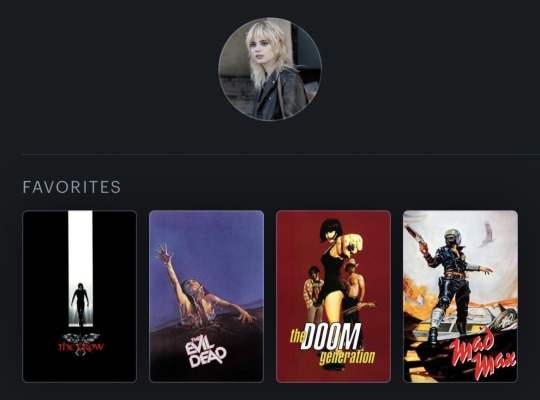
I think Nat is a huge horror movie fan (specifically 80s slasher and demonic possession) and loves edgy gothic vibes. I also think she would love some artsy indie movies about sex and challenging gender roles (and just some cool action movies with hot badass women).
Honorable mentions go to The Craft and Kill Bill
Misty
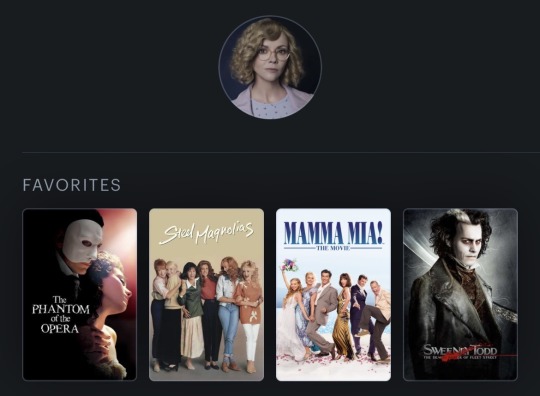
We all know Misty is a theater kid. She loves musicals and I think girlie is definitely singing Sweeney Todd and Phantom of the Opera songs to herself 24/7. And I feel like I don’t even need to explain the Steel Magnolias inclusion, she had that monologue memorized like it was imprinted on her soul.
Honorable mentions go to Hairspray and Hamilton
Jackie
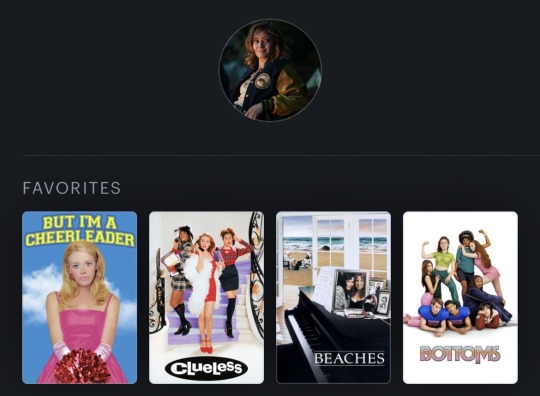
I know Jackie loves a good chick flick, particularly those with homoerotic subtexts. I think, if she had gotten to live long enough to start coming to terms with her sexuality, But I’m a Cheerleader would definitely be her gay awakening. And then Bottoms once she’s tip-toed out of the closet a little bit more (RIP Jackie Taylor you would have LOVED Bottoms). And of course, I had to add Beaches because of the “Are you quoting Beaches at me right now?” line, and also because I think Jackie would watch it and shed a secret tear because it makes her think of her and Shauna.
Honorable mentions go to Uptown Girls and Heathers
Van
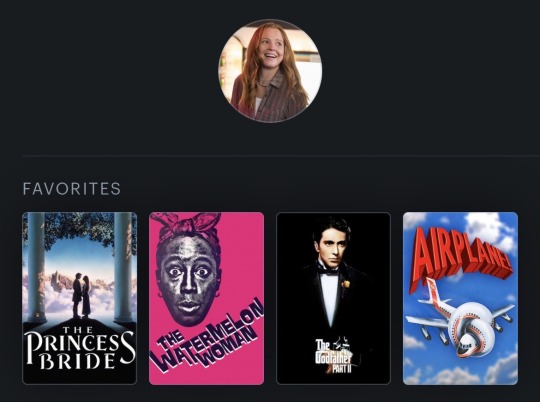
Van would definitely refuse to watch anything past the 90s. She loves comedy classics and queer staples. I know Van quotes The Godfather in the full Italian accent constantly (especially around Nat to piss her off) and she’s watched The Princess Bride an ungodly amount of times and knows pretty much every line (Buttercup was her queer awakening).
Shauna
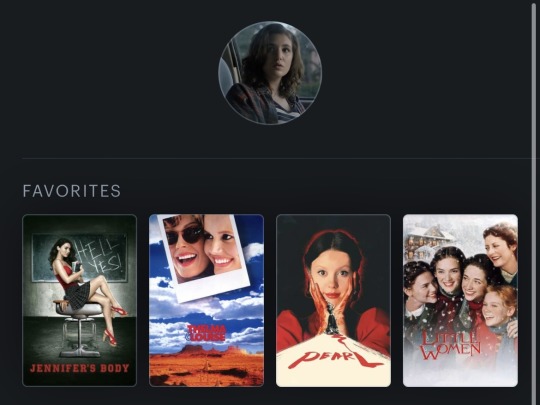
Like Jackie, Shauna love movies about intense (homoerotic) friendships. I know she relates to Needy in Jennifer’s Body living in Jennifer’s (Jackie’s) shadow and resenting her for it but also being so obsessed and intertwined with her; and she also just loves the visuals and its satire on female exploitation. Shauna maybe relates to and roots for Pearl a little too much, she loves a movie about a woman desperate for recognition and teetering on the edge of insanity while maintaining a sweet and innocent facade. Also I can see adult Shauna in particular just being charmed by Little Women (partly because of the love triangle but mostly because of the womanhood and female friendship themes).
Honorable mentions go to Juno and Scream
Also side note: I feel like Shauna would love Daria, but it’s a TV show so I didn’t include it.
Laura Lee
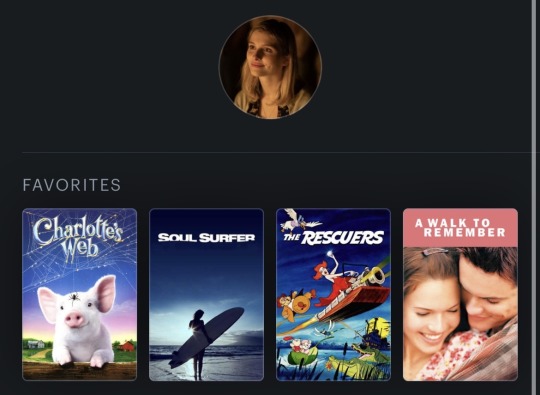
Laura Lee loves uplifting and wholesome movies. I can see her shamelessly liking kid’s movies well into adulthood. She likes movies centered around helping people in need like The Rescuers or going through hardship and discovering faith like Soul Surfer. Girl is religious-religious so her favorites are definitely going to be centered around faith and Christianity. But she also just likes a simple feel-good film; the cheesiest, sappiest movies you can imagine.
Lottie
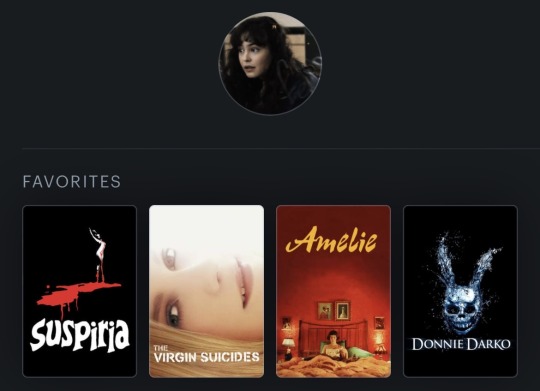
Okay Lottie was hard to pinpoint but I’m pretty sure she would like angsty, artsy shit. Like, in high school, she would pretend to love chick flicks like the rest of her classmates but when she gets home she’s putting on the darkest and most depressing weird girl movie you’ve ever seen. I think she likes Suspiria for the occult themes, the otherworldly feeling of it, and eccentricities of the main character who never knows what’s real and what’s not, which she relates to. I think she likes some mental illness movies like Donnie Darko because of her diagnosis and upbringing and The Virgin Suicides because she’s lonely and feels overly-controlled by her parents. And Amelie because she once again relates to the loneliness and likes that the main character discovers her gift for helping people. I think Lottie would prioritize good cinematography and visuals in movies, too.
I don’t think Lottie would really watch movies as an adult because she would be too busy running a cult and disconnecting from society, which is why these picks are centered around Teen Lottie.
-
I couldn’t think of what Tai would like! She is a mystery to me. I can see her maybe liking something like Whiplash because she is super driven and ambitious and kind of tortures herself for success? But idk. Please comment or repost with what you think her’s would be!
#yellowjackets#natalie scatorccio#jackie taylor#misty quigley#shauna shipman#taissa turner#van palmer#yj#letterboxd#lottie matthews#laura lee yellowjackets
96 notes
·
View notes
Text
Violence and Love in Monkey Man

Dev Patel's Monkey Man has played at my mind for two weeks now. This is for reasons that I'm able to articulate and for many that I probably have not yet been able to find the words for. This post is, in part, my attempt at sorting through some of my thoughts. My tumblr is all spoilers all the time. If you don’t want that, then please don’t read on.
Violence
Like most places in the world, systemic violence is a scourge in India. Monkey Man does not shy away from this reality and depicts Hindu nationalist state violence and violence against women and gendered minorities in the country to chilling effect.
We come to see this in the brutal rape and murder of Kid's activist mother at the hands of the police, while she tries to shield her child and her land from police and state terror. We see it in the treatment of (largely femme-presenting) sex workers in the two brothels featured in the film, including one frequented by the police and political elite. We see it in the violence and ostracisation meted out against the hijra, or third gender community by individual actors and the state more broadly. We see it in the state-orchestrated razing of an entire community after the land on which it sits is declared a "holy site". We see it in the movement of people from the regions to the city after their land has been stolen and the grinding poverty they face as a result.

Unlike so many action films, none of the violence in Monkey Man occurs in a vacuum. Even Kid's original means of making money in an underground fighting ring is done against the backdrop of his forced displacement from regional India to the city - a migration pathway that many in the country have been forced to take and which is a direct result of land theft and resource extraction in the regions by local and multinational corporations as well as federal and state governments.
The truth is that so much in relation to state and societal control is enacted in painful and violent ways on the bodies of the marginalised and oppressed. And I often think about how the horror and action genres are some of the best suited to speak about systemic injustice because of their capacity to make that violence uncompromisingly visible (one recent example is Mike Flanagan’s Midnight Mass which depicted the bloody fallout of the Christian missionary/colonial project in vivid crimson, splashed all over a non-descript maritime town in present-day America). The violence in Monkey Man is no different.
While Kid's realisation of the interconnectedness and heavy hand of the state not just in the violence experienced by his mother, but also by the hijra, and by sex workers like Sita comes later in the movie, we as the audience are given this insight earlier. Recall Kid pointing out to Sita that her tattoo is of a koel, not a sparrow as originally misidentified by the Australian client sexually assaulting her minutes earlier in the film.
Kid goes on to say that he grew up in the forest and woke up to koels singing everyday. Its the longest conversation that the two have but in those brief words, we understand that Sita too has likely been displaced to the city from the regions, probably under very similar circumstances to Kid. The way this displacement maps itself onto her body is distinctive to how it does so for Kid, with gender playing a large role in this.

Other factors like caste, class and religion also impact on how the characters in this film experience or perpetrate violence. I would write more on these intersections but then this post is going to get more unwieldy than it already is.
I will say though, that in India, where fascist Hindu nationalism is being used by government to harm minority communities, steal land and secure populist votes, Patel makes a distinction between revelatory and weaponised faith. Kid is raised in peace by his mother with the former, but as an adult he lives in a world where the latter has taken hold and is being used by those in power to shore up more of that power for themselves.
For me - as the descendant of parents, grandparents and great grandparents who lived through anti-Tamil pogroms led by Sinhalese chauvinists weaponising Buddhism as part of their fascism in Sri Lanka, who like the rest of us, is living in an election year for Hindu nationalist Prime Minister Narendra Modi in India, and who is also frustratingly, helplessly bearing witness as the state of Israel and it’s allies conflate Zionism with Judaism in defence of the genocide being waged against Palestinians - watching this action film make the distinction between revelatory and weaponised faith was profound.
Love
Patel makes it a point in this film to show how Kid's most nourishing relationships, the ones that sustain him - indeed the ones that literally save his life - are those that he has with women and with people who don’t conform to the gender binary. In doing this, we see what Kid is fighting tooth (quite literally) and nail for throughout the film. We see what is at stake - what we stand to lose - if perpetrators get to rule without accountability.
Its also no mistake that these relationships are all tied visually to the natural world in the film: Kid's mother's deep ties to the earth, rivers, trees and roots that she leads him through as a child. Alpha and the hijra's sanctuary, the Ardhanareeshvara temple with its most sacred space being the roots of a holy tree. Sita and her koel tattoo: the memory of the forest carried on her skin while she traverses the brutal reality of the city. Patel is making a point here too. About nourishment of another kind, through our connection with the earth instead of extraction from it. The visuals in the film drive this point home, particularly when contrasted with the industrialisation and poverty of the city.
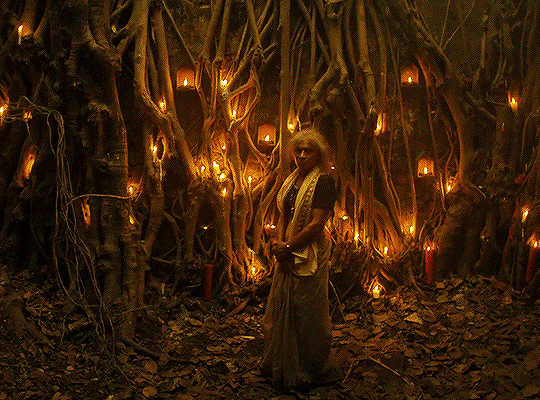
Two particular loving relationships that stood out for me were the love shared between Kid and the hijra community as well as between him and his mother.
Alpha, hijra Elder and the hijra community
Keeper of the Ardhanareeshvara Temple and hijra Elder, Alpha becomes a mother-figure to Kid after he is rescued with near-fatal injuries. It is Alpha who keeps watch over him as he recovers, helps Kid to confront the totality of his past memories which his trauma has kept fragmented, and who ultimately leads a veritable hijra army to join forces with him to assassinate some fascists.
Alpha's gentleness with Kid was so moving to see, in particular during the conversation they have about his attempt as a child to save his mother from the fire set by her rapist and murderer. That exchange moved me to tears.
Kid: I failed her.
Alpha: No. You tried to save her. You see scars. I see the courage of a child fighting to save his mother.

The wider hijra community at the temple also take Kid in and care for him during his recovery. Truly, the scenes at the temple were some of my favourite in Monkey Man. Outside of his memories of his mother, they are the only scenes where we see love, peace and joy on the faces of any of the characters in this film.

Also witness this moment of delight below as the hijra at the temple appreciate a fine ass man channelling his righteous anger and fucking up a punching bag full of rice. I note that the music during this training montage is simply stunning. Ustad Zakir Hussain's rapid fire tablas punctuated by each of Patel's landed punches and kicks and then followed by Jed Kurzel's achingly soaring instrumentals (listen to "The Kid" from the movie's score) were just *chef’s kiss*.

Another favourite moment for me was when Kid decides to go back to the underground fight ring one last time and not throw his matches (as he had been doing prior). He bets on himself and when he inevitably wins his fights, he takes the money and gives it to the hijra, ensuring that they can continue to live at the temple without fear of being evicted. We love to see a man who literally pays his rent.
Neela, his mother
Kid’s first teacher and the center of his life as a child. In almost every memory we are shown of her, Kid remembers his mother walking through a forest, sharing her ecological and religious knowledge with him and in doing so, positioning him within the wider world.

GIF by dailyflicks
We watch as he takes this understanding with him forward through the remainder of the film. His conversation as an adult with Alphonso as they drive through the city in the latter's tuk tuk is emblematic of this. "They don't even see us", Kid says of the elite who frequent the club where he has just gained employment, "they're all up there living and we are stuck in this."
His mother showed him what it was to live: to be still and in concert with the world and the Divine around you, to be loved fiercely, and to thrive as a result. This is in stark contrast to what Kid has had to learn to do in the city: to survive, to merely exist. He is never depicted resting or at home as an adult. He's always working, hustling and planning for the next thing, his next step. When he loses his village, his land and his mother as a child, Kid also inevitably loses his sense of home. It’s no coincidence that the tracks “Home” and “Mother” on the movie’s score sound almost identical.
Later at the end of the film, we see Kid close his eyes, having done what he set out to do. The last thing he sees is his mother, smiling at him in the forest. Her face is the face of God he gazes at before he succumbs to his injuries. This devotion to his mother is not just that of a child to a parent. Its also deeply tied to his Hindu faith which calls on its followers to honour the Divine Mother, the supreme feminine energy, Aathi Parashakthi, in all her manifestations including in those who mother us.
The movie ends with Kid’s deep, revelatory faith - instilled in him by his mother - and with the death of the man who weaponised that faith for power and wealth. It left all of us in the cinema seated in stunned silence even as the credits began to roll.

To describe Monkey Man as simply a revenge film does it an absolute disservice. This is not revenge. It is defence borne out of deep love for community and righteous opposition to injustice. Seeing hijra warriors dressed as Kali, the goddess of destruction, dealing death blows against fascists while spinning in the most beautiful lenghas was exhilarating (I literally screamed “YESSSSSSS!” at the screen when they arrived). Seeing Sita take out pimp and sex trafficker Queenie got me cackling and yelling “whoooop!”. Seeing Kid, a masculine character act to defend women and people outside of the gender binary, from further systemic harm without any ulterior motive was absolutely unreal to witness on the big screen. Seeing a person of faith act in deep connection to that faith without judgment against anyone but those who perpetrate harm made me feel hopeful in a way that took me by surprise. Kid acted out of love and respect. I would argue that Sita, the hijra and Kid all acted out of recognition of a shared humanity.
And at a time when folks from marginalised communities are being subjected to horrendous violence worldwide, both interpersonal and systemic, watching the oppressed take their perpetrators out…and I mean out (see: a rapist and murderer getting bludgeoned to death with a glittery high heel and a fascist, self-proclaimed “holy man” being stabbed in his third eye by the blade he hid in his own “sacred” pathankal/paduka), well, it was cathartic to see.
Am I saying violence is the answer to systemic violence? I think the answer to that question is context-specific. Non-violent resistance has a place, but it’s by necessity a performance and requires an audience. What do you do when no one’s watching? What do you do when the people who are watching are doing nothing to stop your suffering? What then? These questions are what many liberals refuse to grapple with because the answers are too uncomfortable for their polite sensibilities. But if you keep your foot on someone's neck long enough, you should expect them to fight back, by any means necessary. In Monkey Man, we have an action film where we get to witness that resistance in all its visceral glory.
#monkey man#dev patel#jordan peele#vipin sharma#adithi kalkunte#sobhita dhulipala#reva marchellin#dayangku zyana#this post is so fucking long but this movie has been sitting on my heart and my chest for days
126 notes
·
View notes
Text
Stray Kids Reacts to their Partner's Death Scene
Plot: You're an actor, and you've landed a role where your character ends up dying - a first in your career. You watch the movie with your boyfriend and gauge their reaction.
Pairing: Stray Kids x gender-ambiguous!actor!Reader
Total Word Count: 1.4K
Tropes: idol!AU, actor!AU, established relationship, reactions
Contains: death of reader's character, various shows of anger, pouting, hurt/comfort(?), cuddles and/or implication of cuddles, teasing
A/N: Follow up to the ATEEZ version, which you can find here. Special thanks to connected storyteller Haru (@umbralhelwolf) for suggesting/requesting these ideas a while back.
Bangchan - Head over heels for his lover, he'd ask so many questions about the film as soon as you get the role. But, no matter how much he knows, he'll sit with you and watch intently. He's likely to make small comments on design and direction if he likes it, even if only slightly. Oh boy, when you're on screen, though. Heart-eyes, that bright twinkle, an ear-to-ear smile - man is in love with everything about you. And that's exactly why you didn't tell him that your character gets killed towards the end. Even if you're the main character's best friend and all of the audience is attached to you, you don't have the plot armor to live through the movie. When your boyfriend figures this out, he jumps to his feet with his head on a swivel between you and the screen. Laughing at his reaction, you pause the movie and let him rant about the betrayal of killing off the most loved side character, with small interjections about how believable your acting has become.
Lee Know - Mostly just enjoying a new slasher movie, he forgets that you're in it until he sees your first on-screen appearance around midway through the film. Suddenly, you watch his interest pique, like a dog hearing the word 'treat' or a cat hearing the can opener. Although he doesn't speak much during the movie, you know him well enough to read his body language. Seeing how much he clings to your character, you almost feel guilty as their death nears. In a dramatic chase, your character accidentally falls into a trap set for the killer, giving the killer a perfect opportunity to kill them off. Even if the death happens off-screen, Minho's reaction to your desperate screams for help hurts you. He tenses, knuckles white as he balls his hands into fists. You rub his back to keep him calm, and he resists reacting until the ending credits roll. He pouts about killing off his favorite character, especially making it someone else's fault entirely. He'll insist on rewriting it and doing it the "right" way, but you both know he's only joking around as an excuse to compliment your skills.
Changbin - Excited that you asked him to come with you to the premiere in theatres, Changbin dons a nice outfit that matches yours and follows your lead. It's the first big-name movie you star in, so he's excited to experience it with you, especially since you have a bigger role in a satirical horror film. He has no idea what to expect, so he has big reactions all night. By your death, he caught onto the theme of killing off the main characters - in stark contrast to normally killing off the side characters in other horror films - so he expected the death and chose to zone in on your acting. The death, however, isn't where his reactions are best; the ending, where everyone revives after the curse breaks, gets a strong reaction out of him. He finds your zombified acting adorable and lovingly teases you about it for days.
Hyunjin - Jumpy baby only agreed to watch your film in the safety of a blanket burrito, armed with snacks that wouldn't cause a mess when jumpscares inevitably startle him. Although there are plenty of classicly-timed scares in your slasher, he never adjusts. Half the time, he doesn't even know when you're on screen since he's hiding his eyes so often, but when he sees you, he calms down a bit. It's funny since you're a villain, but it's nice to know that your presence calms him - no matter the situation. Teaming up with the killer gets you through most of the film, but the others eventually figure out your stance and bait the killer into getting you. Hyunjin, only loosely following the plot, feels betrayed by the group and insists that they could've approached your character better than simply presenting them with death. He also picks apart the killer's lack of loyalty - as if the character isn't a total psychopath. After the movie, he urges you to choose a softer script next time, as he wants to enjoy your acting more without the threat of your character's death.
Han - As a fan of horror movies, he predicts your death from the moment he figures out that you play the main character's love interest. Although you pout about him analyzing your film, he insists that he'll still love seeing the movie, even if he knows what happens. As you continue watching, you find Jisung leaning forward whenever you're on screen. This is especially true during your death scene, as he interlaces his fingers and uses them to cover his face, leaving room for his eyes regardless. He doesn't want to watch you die but admits that your acting is too good to look away. After you're erased from the remainder of the movie, he chooses to talk about your acting instead of watching the movie as closely as before. Through his compliments, he admits that you might be made for roles involving death, as he found that scene to be one of his favorites.
Felix - Although he's excited, the jumpscares require cuddles. He encouraged you to try a new genre when you felt a bit off about work, so he's glad that you had fun filming horror, but his excitement and anxiety melt together as he sits down to watch. Luckily, the film doesn't play with too many jumpscares, so he can watch in your arms without much issue. When your death scene approaches, you feel his grip around your arm tighten. He uses your arms as a barrier, shielding his eyes from the scene. Reaching for the remote to pause, he pouts about not warning him about the plot point.
"Your acting is too realistic for me to watch something like that!"
He'll scold and ask whether the plan was to make him cry. If you bring up his sadder parts in music videos, he'll insist that his acting isn't as good as yours so it isn't the same. His reaction will wordlessly beg for cuddles for the remainder of the night - which, of course, you easily comply with.
Seungmin - As he sits down, he jokes about how it can't be too scary if you have the second lead - poking fun at you like normal. Brushing him off with a quick response, you play the movie and ensure subtitles are on. As the movie progresses, you find your boyfriend holding your hand in his lap, squeezing during scares or intense moments. You can't help but smirk at how scared he seems after his claim before the movie started. When you're backed into a corner by the killer, the suspense has Seungmin on edge; it almost feels like he'll crush your hand with his. He doesn't react much outwardly, but after the movie, he talks about having to join you in movies next time, saying that you'll be a lead couple in a romance film. He never says it outright, but all of his comments are his roundabout admission that he loves your acting - especially when he comments on how he would've thought you really died if you weren't there with him. You make sure to comment on the fact that you nearly lost a hand watching with him, making him more dangerous than the movie's filming.
I.N. - He's seen your acting plenty of times, and he always compares you to big-name actors. He is your biggest fan, so of course you bring him to the opening night of the first film where you play the main character. You didn't tell him anything about it and even hid the trailer away from him, so he didn't know he'd be walking into a paranormal thriller. However, he expected to be okay - you're the main character, after all, so you have plot armor. So he thought. After a dozen or so close calls, the end of the movie nears. In the final scene, the creature drives everyone insane, resulting in the main character driving themselves into a ravine. Although uncertain of the outcome, he turns to you with wide eyes, clearly asking for an explanation. When you leave the theatre, he rants about how they can kill off the main character, wondering how they plan to make a sequel or anything related to the film. You assure him that you might not have died, but he continues ranting about them killing you off, not stopping until you interrupt him and distract him with a kiss.
#cultofdionysusnet#kpop scenarios#kpop imagines#kpop reactions#stray kids#stray kids scenarios#stray kids imagines#stray kids reactions#skz#skz scenarios#skz imagines#skz reactions
213 notes
·
View notes
Text
Gothic Recommendations
So, I gave a talk on Crimson Peak this morning for Romancing The Gothic - and people asked if I had any recommendations for films that fit the same vibe as Crimson Peak!
Some of these are gothic period pieces, some just fit the gothic vibe, and others just fit well with Crimson Peak mood wise or theme wise.
Jane Eyre (2011) - Jane Eyre is no particular favourite of mine, but Mia Wasikowska in this role really rocks it, especially in contrast to her role as Edith in Crimson Peak.
The Woman In Black (2012) - I love this film, I've seen it almost as many times as I've rewatched Crimson Peak, and I think as a piece of gothic horror and as a period piece, it's just glorious.
Only Lovers Left Alive (2013) - This piece is full to the brim with yearning and lust and is so fucking good as a gothic vampire flick.
Perfume: Story of a Murderer (2006) - This is another favourite of mine, Ben Whishaw is glorious in this role and there's some creepy Alan Rickman at play as well.
Quills (2000) - This one is a good gothic romance, I would say, very dark and macabre - there actually is an arguable supernatural element, but at the core of the sadomasochism here there's a deep level of macabre.
Fanny Lye Deliver'd (2019) - This one isn't gothic at all, but delving into Puritan ideals contrasts it well with gothic vibes of religious conservatism and emotional repression whilst at the same time still maintaining similar challenges and explorations of gender roles, sexuality, and the roles of women within and around the patriarchy.
75 notes
·
View notes
Text
ive always said that in order to create an enjoyable and varied filmography for the humble completionist the actor must tick a few specific boxes, as follows. list is gender neutral but women generally seem to score lower because hollywood is corrupt and anti-lesbian. ahem
• obviously a same sex kiss. ideally there should be at least one in every decade of the actor’s career
• role where they wear glasses
• role with drastically different haircut. im talking wigs, im talking early career bad dye job, whatever it takes
• misjudged and baffling accent
• murderer
• bitchy waiter or retail employee
• gratuitous whump movie or guest role on medical drama
• sexy period piece or anything with elaborate costumes
• horror or thriller movie with beautiful lighting, to showcase screaming talents
• movie where the actor inexplicably has to care for a child, animal, or ailing friend, even better if they’re a parent
• made for tv film thats surprisingly enjoyable but you will never ever ever be able to convince your friends to watch it
• baffling children’s film that feels like a money laundering operation
28 notes
·
View notes
Text
Director Deep Dive: The “Feminine Gaze” of Zeng Qingjie (A Familiar Stranger, Butterflied Lover)
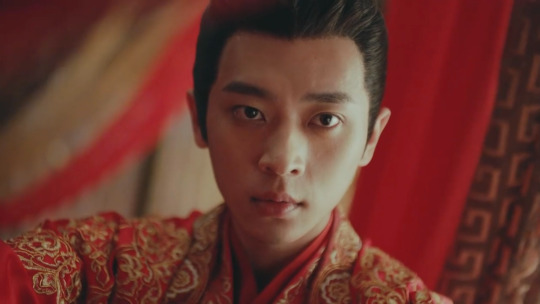
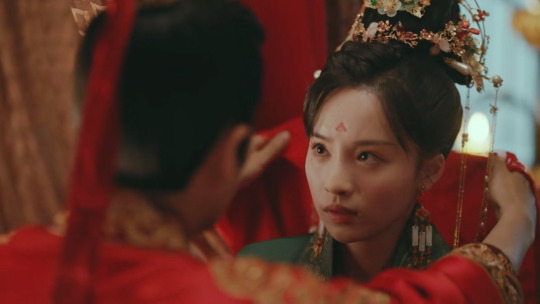
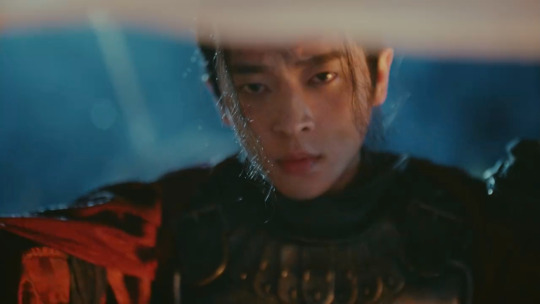
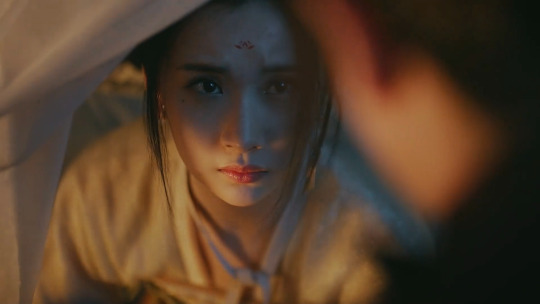
What does it mean to film something through a “feminine gaze”?
Unsurprisingly, this is a tough question to answer. In filmmaking, the feminine gaze is usually offered as an alternative to the “male gaze” or the ways movies and tv depict women as passive sex objects. Although filmmakers and scholars disagree over the definition and even value of the term, I like to think that, in its most basic form, the feminine gaze is visual storytelling that subverts or redefines how gender looks on screen.
I think one director whose visual storytelling often taps into that feminine gaze is Zeng Qingjie so I thought it would be interesting to discuss some of the stylistic choices that make his work unique.
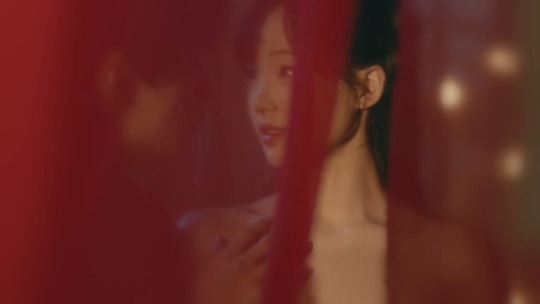
I first came across Zeng’s work via the short dramas A Familiar Stranger and Butterflied Lover.
What struck me about these two fantasy romances is how different they feel despite having relatively standard plots for their genre. Both dramas are dreamy and refreshingly sensual and intimate. They touch on taboo topics like menstruation, abortion, and the dangers of pregnancy while also quietly challenging traditional gender roles. But most interesting to me is how they center their women protagonists not just in the plot but in the way the camera captures their image. These are women stories and it's evident down to the cinematography.
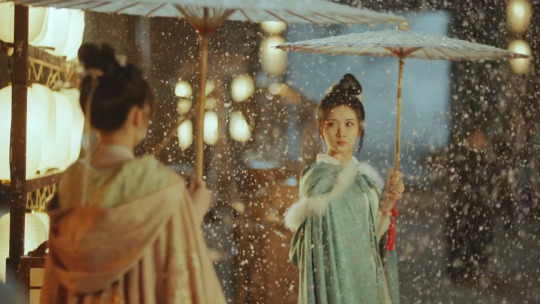
Style Element: Subjectivity
For instance, Zeng's visual storytelling often uses subjectivity.
Subjective cinematography is when we the viewers see what a character sees or feel what a character feels because of the camera’s position, movement, lenses, etc. It’s considered a critical feature of the feminine gaze because it forces us to recognize the thoughts and feelings of women characters who are often overlooked in traditional media.
Zeng adopts several cinematography techniques to put the audience in the mind of his women protagonists, and together these techniques encourage us to empathize with them, especially in their darkest moments.
One of my favorite examples of this is an early scene of Butterflied Lover.
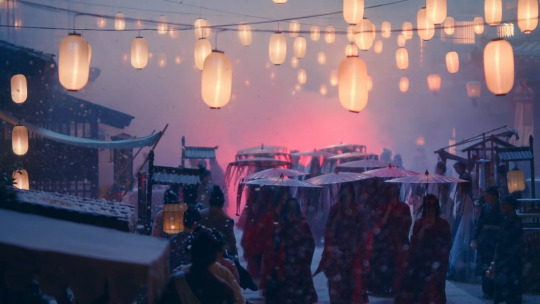
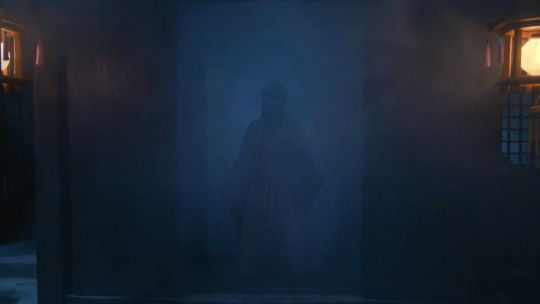
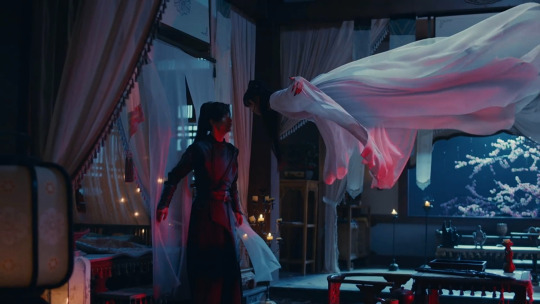
In the drama, Tang Qianyue, the FL, has been infected by a poison that turns people into monsters known as "butterfly slaves". Qianyue knows she has been infected but to appear normal in front of her loved ones secretly suppresses her monster form. One day, however, she begins turning into a butterfly slave against her will.
As seen above, the scene of her transformation consists of many long shots that showcase the full horror of her monster form.
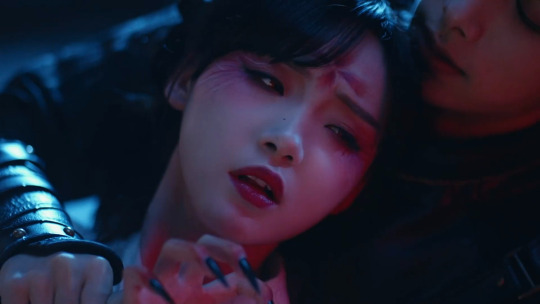
But the scene ends with a close-up of her face, the camera lingering on the anguish she feels at her body betraying her. Look at how the camera keeps her face in focus but her claws blur with the background, her blood-red eyes hidden in shadow. Zeng wants us to understand how she feels in this moment, not what danger she presents. She might be a monster but we feel pity for her rather than hate or disgust because of the humanizing subjectivity of the camera language.
(Side Note: I don't think it's an accident that most of the infected people shown in their butterfly slave form are women given that monsters in media often symbolize the unknown or uncontrollable elements of the feminine experience. It makes me wonder about the role of female monsters in Chinese myth and whether there are parallels to their patriarchal meaning in Ancient Greek mythology.)
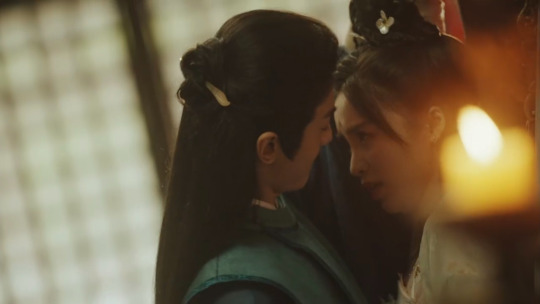
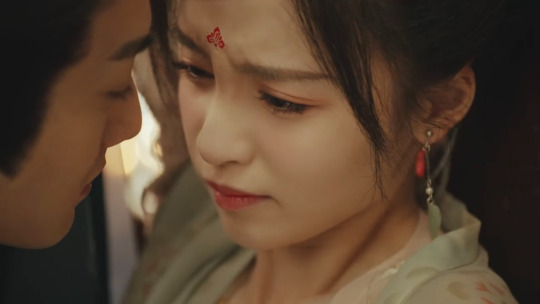
I think another good example of this humanizing camera language is in the sexual assault scene of A Familiar Stranger.
Unlike many shows that depict sexual assault in an erotic way (i.e., filmed to make us sexually excited about a woman’s powerlessness and nakedness), Zeng uses a combination of close-ups, shallow depth of field, and canted angles to make us feel the violation. With the intimate but disorienting effect of these camera techniques, we feel Shi Qi's duress but also clearly see her attacker's abuse of power. We feel what she feels and therefore have a better understanding of what it's like being a woman trying to navigate the world. It’s an awful moment but one that doesn't objectify or visually disempower her as a character.
Style Element: Sexuality and Feminine Desire
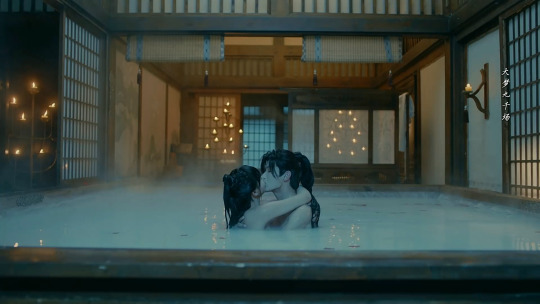
(Side Note: Woot woot pregnancy sex)
Zeng also challenges the ways women's bodies are typically objectified on screen by how he portrays his characters' sexuality. In his dramas, women aren't sex objects but instead subjects who experience sexual desire and express their sensuality.
I love the intro of A Familiar Stranger for this very reason.
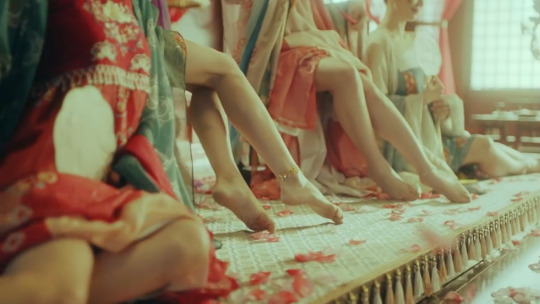
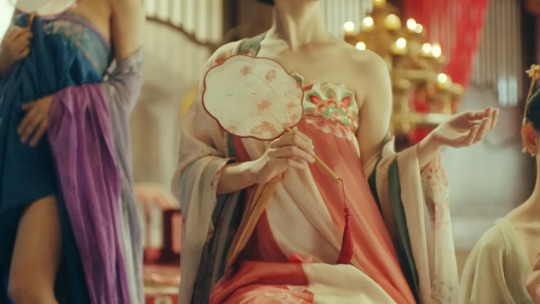
The show opens with the camera languidly panning across a line of bare legs and scantily clad bodies, their owners posed seductively. It’s a stereotypical example of the male gaze reducing women to their bodies.
But then Zeng's subverts this male gaze when he has one of the women look right into the camera in a subtle fourth wall break.
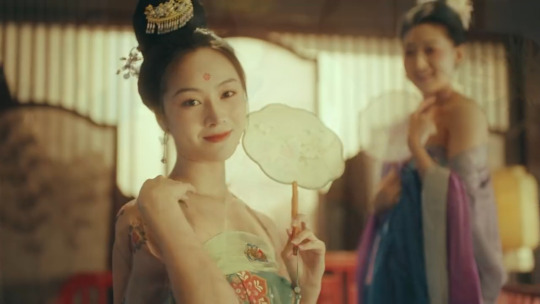
According to filmmaker-critic Joey Soloway, such moments are an example of "returning the gaze" and are a way for women characters to articulate how they feel about being seen as objects:
"When a female character breaks the fourth wall, they acknowledge the reality that they are being watched and are refusing to remain passive in that. Instead of being gazed upon, they remind us of their agency by directly addressing us and giving us insight into what they’re thinking and what emotions their actions are being motivated by." (Mariel Cipriaso)
Through this technique, we learn that the seductive performance is not for the benefit of some man on screen (or in the audience) but instead themselves. These women, who also happen to be sex workers, are posing for a portrait as a cheeky way to celebrate their own beauty and sensuality divorced from the services they provide male clients (with some sapphic undertones to boot!).
They are in control of the camera not the other way around.
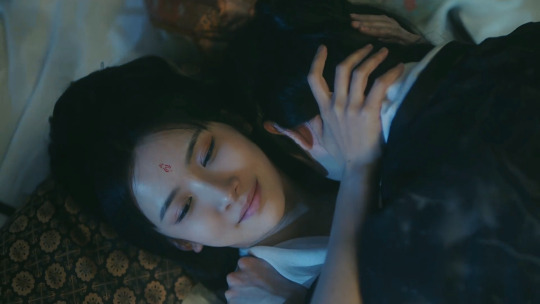
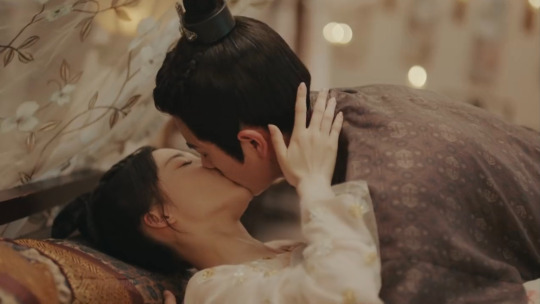
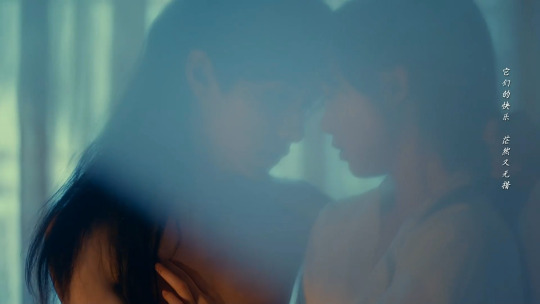
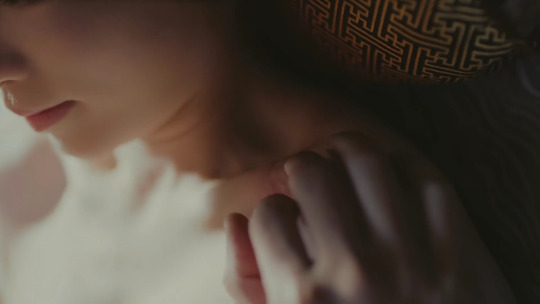
Ultimately, these are stories where women find pleasure, and the intimacy scenes reflect that.
Everything is softly lit and impressionistically shot as if the characters are lost in the haze of their mutual desire. The use of close-up and extreme close-up shots further play with our senses, giving us the tactile feeling of skin on skin, breath against breath. Unlike stories filmed through the male gaze, Zeng’s camera doesn’t reduce his women characters to body parts and mere receptacles of male desire—they’re active participants who desire and enjoy their partners just as much.
And what I find particularly interesting is that the scenes don’t just “center” these women’s POV but instead show how sex (and touch more broadly) is a vehicle for emotional intimacy and the impact of that intimacy on their male partners. (That hand flex below is giving Mr. Darcy.) Sex and physical intimacy between men and women is transformative not exploitative.
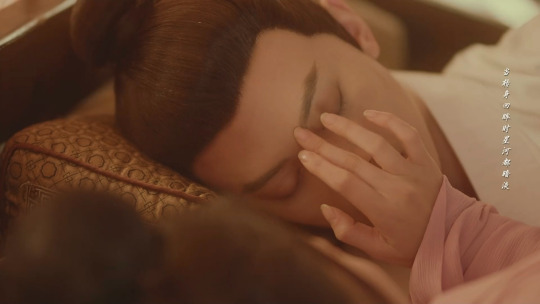
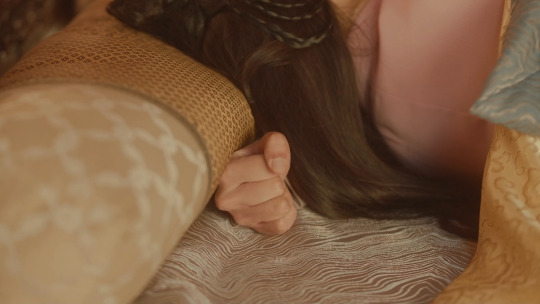
In these two dramas, women aren't objects of desire that men use for their own pleasure but instead subjects who are seen as such by the other characters* and, most importantly, Zeng Qingjie's camera.
(*Side Note: See @well-dressedwords' excellent analysis about the ML in A Familiar Stranger. His intuitive trust towards the FL is an example of seeing her as a subject. He doesn't recognize her for superficial reasons like beauty but her character, which he was able to glean when they first meet and she saves him--hence the title A Familiar Stranger.)
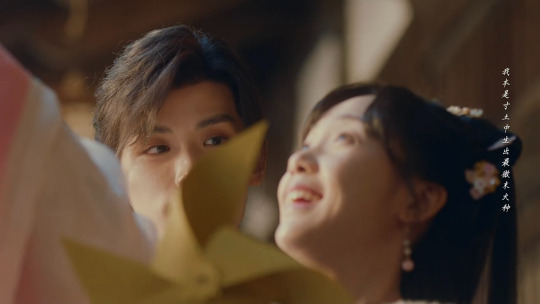
#Zeng Qingjie#director style#a familiar stranger#虚颜#butterflied lover#风月变#cdrama#meta#cinematography#Ke Ying#cheng lei#Rain Lu#zhao yi qin
32 notes
·
View notes
Text
The Woodsboro murders as a movie
A (probably unnecessarily long) meta post about how, in universe, the killings were thought of and concieved throught the lens of a movie rather that, well, serial killings (in MY OPINION). This is borderline incomprehensible but bare with me ok :)
DISCLAMER! Same as my last post, this is only taking into account what we're told in the first movie. I don't think that what they tried to do in Scream 3(by this I mean Roman, not the movie set which I do think is cool) is interesting and I prefer to mostly ignore it :) Ok that's all.
As we all know, one of the main reasons why Scream (1996) is such a great movie is it's meta aspect: the self awareness and self referential nature of the film, that works both as a horror movie and as a horror movie parody (accomplishing both things beautifully I may add), is what makes it stand apart. I don't think I need to explain why Scream "Do you like scary movies?" is very meta, so I won't.
What I want to get into is the movie inside of the movie, the movie that Billy and Stu thought they were making, and basically why I think that was the case (the fact that rather than simply being serial killers they created a narrative). By doing this I also want to try to explain why they failed in-universe and why it could've literally never worked the way they were thinking about it.
Let's get started!
So, first there is the why. Like why even would they do that, you know? We don't know whether everything was planned before they killed Maureen, or if after the fact they decided to keep going, but either way I think that it was always going to happen. By that I mean that, as I mentioned in my motives post (which you should check out ;) ), I don't think that murder in on itself was enough for Billy. As I said, I think that the feeling of regained control, of making everyone unwilling actors in his movie after his mother left, was even more important that the murder in itself. Something that I noticed on a recent rewatch that I had totally forgotten about is the scene where Sidney is in the bathroom and a cheerleader is talking about how she thinks that Sidney is actually the killer. The girl says something along the lines of "she felt so bad but she realized teen suicide is out this year and she decided that murder is a much more healthier form of expression". Ironically, I think that this kind of applies to what Billy went through mentally. Obviously, he didn't not kill himself because "teen suicide is out", but I do think that the notion of murder as expression, one that aligns with his interests (horror movies) is one that resonates with him. The way they do it, the murders are as much creation as they are destruction, you know? After his mom left, it's likely that he did what he could to cope with that fact, and in this case this would be to parallel himself with the many (many, like there's so many wtf) horror villans that don't have a mom, or otherwise have a complicated relationship with her (as Sid would put it, mommy issues).
With this we have Billy simultaniously embodying two figures of power in movies, on outside of the movie as writer and director; and one inside, as the unnatural unstoppable force of the slasher (I'm not even going to get into the slasher as a figure of power in slasher films because that's very long, but I recomend reading literaly any sort of analysis of gender in slasher because it's very cool). This is basically the biggest expression of power one can achieve: he both decides the "genre", what role people play; and literally who lives and dies. By being what are probably his role models both in and out of the screen, he manages to sucessfully be put back into a position where he feels comfortable.
To go off on a tangent, this is also why I feel that any analysis of Scream that doesn't consider the concept of Stuilly at all is missing some of the complexities of the characters, because while it is clear that by doing all of this Billy hopes to reclaim lost power, he also willingly decides to share this newfound power. Something that I love about Billy and Stu is that they aren't killers, they're slashers. Or more accurately, they're a slasher. And no matter what some people say on the internet (it makes me so fucking mad free my boy Stu he gets miscaracterized in all fucking directions) Billy also lets Stu be writer and director. We are explicitly told that Stu "though up the ending" (another way in which they themselves present their spree as a movie), an ending Billy himself praises, and if that doesn't say something about their relationship I don't know what does. Not to mention the literal stabbing. The only way I can really see the situation play out like this, by which I mean Billy deciding to share what the killings mean with someone else, is if there was affection of some kind. One could also say that it's just because he couldn't do it alone, or to having someone to take the fall; but that would also mean admitting to not being powerful, admitting that he alone cannot neither plan or go through with his movie, and that's a huge admission of weakness. All this to say they were gay.
Going back to the main thing, the narrative is not that of normal killings. As is established pretty clearly in the movies by the fact that Sid is the main character, the way the the killings are planned are also done with her very clearly at the center. The plot of Scream is that, a plot, one that is (at least at the start) not really that different from other slashers. You have a murder in the past, in this case the main character's mom; which establishes some stakes and just makes the character more interesting. Then, the new murders start, and at first it's just two people who don't really matter: they are killed, on a narrative level, just to start things up again, to get Sid (and the, for them imaginary, audience). After that, a violent attack, complete with taunts about Sid's mother; and then- the boyfriend! He gets arrested, Sid feels completely crazy, just to then be taunted again about how she gets innocent people in prison. Then the party happens (I skipped the bathroom scene because to me that was not them, it being them makes no sense to me), classic final act. And that's certainly a great movie plot, but it's a pretty stupid murder plot. It's way too complicated and risky, Billy could've not been released; and the party is way too ambitoius. To many things could (and actually do) go wrong.
Another important thing that I sorta already mentioned is the way they talk about it, both before and after the reveal. Before we have the scene at the video store, where they talk about "suspects", and they mess with Randy saying that according to movie logic (which he himself follows during the movie: he actually thinks in a very similar way to Billy and Stu), he could be the killer. Then there's Billys creepy-ass "it's all a movie", and I don't think that needs to be explained. And in the third act-well, it happens a lot with the "ending" and the virgin thing.
But again, as is said in the movie and I sort of said on my motives post, the way that it is a "movie" is not a "crazy" way. By this I mean that they absolutely knew what they were doing, and if they didn't do it like that they would've done it some other way. Billy himself says that "movies don't create psychos, movies make psychos more creative!". So the "artistic" side of the murders is just how the violent thoughs they surely had before manifested in this specific case, with this specific characters.
So, I've established that the murders are thought of like a movie, and why they would even do that (or why Billy would, as I said in my motives post Stu basically did it for funsies and 'cause he's in love, I don't think to him it was that deep. Though of course he still benefited from the control aspect, and maybe that paired with the murder of Casey and Steve...). Now what's left is why I think that this conception of what they were doing is actually the reason why they lost.
The main thing is obvious: in-universe, they are actually killing people with a movie plot. That is stupid behavior, because well, in real life things don't have "narratives". In real life it's not that you can't pick your genre, is that there are no genres to pick. In real life, there is no way you can control as many things as they were trying to (as they needed to for the plan to even work.)
One of those things, to me, is the fact that Dewey and Gale were not characters in their murder movie. Why would they be? They literally have nothing to do with the plot. They are outside the friend group, in a different age range, and if you narrated Scream from Billy and Stu's pov they would only appear at the end, and maybe as background characters before that. So when these two show up at the party, it's a real fucking problem. You can even see Stu a little bit after they show up, and for a second he doesn't look happy at all. We have no way to know how much they had to rework the "third act" to fit with this, but ultimately, it is because of Gale their plan fails. Gale, this random fucking reporter they see on TV sometimes.
There's also the "slasher immortality" thing. Stu himself talks about "the sequel", and in slasher franchises you basically have two ways to do that: either the slasher is the same, or the final girl is the same. The first is obviously much more common, and it's clearly what they were hoping for. The slasher can't die, so they can't die. (what they don't realize, and what makes the scream franchise sort of work even if I don't like where they took it, is that ghostface is the slasher, not the literal killers in each movie. By making their costume so obscuring of who's behind the mask, and giving ghostface a personality of their own, they are separating themselves from the slasher. You can have a sequel with different killers, because like the victims in so many slasher franchises, they are completely replaceable.)
Another reason they fail is very well known, and that's the goddamn stabbing. It's really the most stupid thing they could've done at that moment, but- knowing how things are structured for them, can we really blame them? I mean, they had to do it while Sid was alive, otherwise it wouldn't have been in "the movie". And according to the way they behave, they are so fucking sure they've won. They aren't worried at all, because in their narrative, this is the end. Everything that they accounted for is on it's place. Nothing can go wrong, right? It's a perfect ending.
And just the ending in general. As I said, the party is way too ambitious. Before that, we know they've killed four people successfully, but in all those cases they didn't have to really try that hard. Maureen was just one against the two of them, and she didn't expect it. They had total control of what happened. And the same happens with Casey and Steve: these people had no idea they could even be in danger, and there were few. Even Casey and Steve were taken care of separately. Same with the principal, and even later with Tatum. What they wanted to do with the party is, logistically, a huge jump in difficulty. But they think they can get away with it because that's how slashers work: of course there are higher stakes at the climax! It'll work out anyway, because that's what they wrote!
This overconfidence in their movie logic (ie the fact that Sid has to die because she's no longer a virgin) is what ultimately kills them, but it's not the only "movie thing" that does. Because when she ends them, Sid is literally dressed in their slasher costume, using the same lines they did before. She takes their movie and runs with it, but as she herself says, she doesn't like scary movies, so when Billy wakes up for one last scare she doesn't hesitate. She doesn't give a fuck about the so-called rules, or the narrative, or anything.
And that's why, in her movie, they fucking die.
#scream 1996#stu macher#billy loomis#stuilly#meta post#help me I'm going crazy#I'm probably missing something but whatever
24 notes
·
View notes